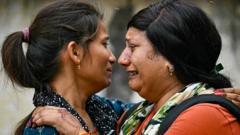Just months after a 20-year sentence for crimes against humanity, former military ruler Moussa Dadis Camara has been pardoned, raising questions about justice and accountability. This decision coincides with the current government’s promise of compensation to the victims of the 2009 tragedy.**
Guinea's Ex-Military Leader Granted Pardon After Massacre Conviction**

Guinea's Ex-Military Leader Granted Pardon After Massacre Conviction**
Moussa Dadis Camara, involved in the infamous 2009 stadium massacre, receives a pardon for health reasons, stirring controversy and highlighting Guinea's complex past.**
In a surprising turn of events, Guinea's ruling military junta has granted a pardon to former military leader Moussa Dadis Camara, who was serving a 20-year prison sentence for his role in one of the country's most notorious atrocities, the 2009 stadium massacre. The pardon, announced on state television, cited health reasons for the decision, although specifics about Camara's condition remain undisclosed.
The horrific events of September 28, 2009, saw over 150 individuals killed and numerous women raped during a government crackdown on a pro-democracy rally in Conakry’s stadium. The targeted violence was executed by troops under Camara’s command, who reacted violently to demonstrators opposing Camara's potential candidacy in forthcoming elections. This brutality left a lasting scar on the nation, prompting long-awaited calls for accountability.
Camara initially came to power in December 2008 following the death of Guinea's longstanding president, Lansana Conté. His return to the spotlight began with an assassination attempt that forced him into exile. He returned to Guinea in 2022 to face justice, maintaining his innocence throughout the legal proceedings, which concluded with a conviction for crimes against humanity alongside several of his military associates.
This unexpected pardon arrives shortly after the junta's announcement to compensate victims of the massacre, an act seen by many as a bid to address the historical injustices perpetrated during Camara's administration. The compensation policy specifies payments of $173,000 for rape victims, $115,500 for deaths or disappearances, and additional amounts for looting and torture claims, as reported by Justice Info.
As Guinea grapples with its turbulent political landscape and the legacy of military governance, Camara's release illustrates the ongoing struggle for justice and reconciliation in a nation still healing from past violations. His confounding pardon has been met with mixed reactions, as many await to see how the current military regime will navigate the complexities of Guinea's painful history and the demands for fundamental rights and reparations from victims and their families.





















